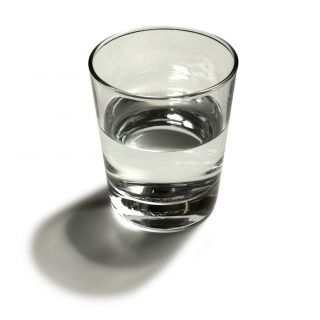
Cognition
Water, Water, Everywhere
Thinking about our relationship with life's most basic necessity
Posted April 30, 2014

Reading about the commodification of water (Wilk, 2006; Vannini, Taggart, 2013) is yet another reminder of how deep consumerism has reached into our everyday lives, in this case so deeply that it has re-framed and commodified items usually associated with our basic needs for survival. In a way, the commodification of water is the emblematic example of the commodification of our lives; we have reached a point where “people pay for things that they already have in abundance around them” because “goods have magical powers…that have nothing to do with ‘needs’”(Wilk 2006).
Aside from the commodification of basic resources, water also shines a light on the problematic issue of the privatization of basic resources. Choosing between the government and corporations, many individuals and societies rely on larger institutions in order to meet their basic needs. We either have to rely on the government to protect our rights to vital resources and provide a means to access these resources or we must rely on corporations to provide these resources at a price.
In recent years, assisted by marketing departments and branding strategies, corporations have figured out how to privatize the water industry and sell water to in-need consumers while also potentially degrading the credibility (drinkability) state provided resources (when you can find/access them). It is not uncommon to find a person who thinks tap water is unclean, “gross”, or somehow contaminated. The problem of privatized water is felt even more in places where apprehensions about local/government water might actually be true (i.e. in less developed places, countries). In these areas, locals have no choice but to pay for and drink corporate water. The need for this resource is so deeply felt that boycotting corporate water or waiting for a state provided source is not a reasonable solution and so the cycle continues.
In places where water is abundant, corporations have found ways to make water exotic and elite; beginning with spa locations such as Perrier and Vichy, water gained cultural meaning and elitist significance and this meaning has since extended outward to all types of “mineral water”. Additionally, waters sourced from certain exotic locations such as Figi and Poland Spring picked up on this ability to brand water and found new places to commodify along with the resource itself. (Wilk, 2006) In another, newer, branding strategy, corporations have found a way to supposedly improve water by creating water infused with vitamins and electrolytes, perpetuating the idea that merely drinking water isn’t enough – now you need to be drinking better, healthier water.
Vannini and Taggart (2013) provided a unique look into the lives of individuals who have escaped (or opted out of) the corporate/government water provision options. They interviewed individuals who live an off-grid lifestyle, meaning they are disconnected from any state provided resources and do not engage in modern consumption practices. Specifically, Vannini and Taggart focused on how these individuals procure and use water. All the individuals that Vannini and Taggart talked with had different and interesting methods for obtaining and using water but all had very distinct relationships with the resource and the process of getting and using it.
Vannini and Taggart found that, in regards to water, off-grid individuals engaged in what they called “onerous consumption – a type of consumption characterized by willfully chosen burdensome involvement” which was often “recognized to be a self-fulfilling moral responsibility and even a treasured privilege of their chosen lifestyle.” The off-grid individuals spent a lot of time getting water and were very conscious of their use of the resource but many enjoyed the process and felt that it was time well-spent. Unlike most consumers today, these individuals engaged with the resource in a very intimate way and understood the labor that is required and hence seemed more aware of the role water played in their lives. This awareness and worldview seems to differ from the more common perspective of individuals’ who get their water from a tap and live in places where water can be bought or easily accessed. However, there are moments in more mainstream lifestyles when the importance of water is deeply felt, most often when it becomes inaccessible, as was the case recently in Charleston, West Virginia when local water sources were contaminated for a period of several weeks due to chemical leakage into the Elk River from a nearby coal company.
However, since we do not all live off-grid, how does onerous consumption and raising awareness of our water consumption relate to individuals living a more “mainstream” lifestyle? Thinking about how onerous water consumption can be translated into “mainstream” terms brings to mind the act of carrying around a plastic or metal water bottle. Individuals who do this bear the burden (literally) of remembering, carrying, and filling the water bottle and are required to be aware that they must find a public or accessible water source to do so. These practices may invoke a similar type of consumption that is experienced by off-grid individuals where, in both situations, the individual decides to take responsibility for finding water and being aware of their water consumption.
On the other hand, it’s possible that there is a less awareness required in the mainstream version making the process of consumption less “onerous” and still strikingly different from the individuals who live off-grid. Off-griders’ engagement with the resource, figuring out methods to actually obtain water (other than a tap), and then saving the water and only using as much as they need (versus having an unlimited tap) probably creates a different experience of and relationship with water. But when we live in a world where our most basic resources are increasingly commodified and privatized, using a water bottle and becoming more aware of our connection with and need for water might be a step towards environmental responsibility and might possibly begin to re-frame our relationship and understanding of this basic necessity.
Sources:
Vannini, P., Taggart J. (2013). Onerous Consumption: The Alternative Hedonism of Off-Grid Domestic Water Use. Journal of Consumer Culture, published online 11 November 2013, DOI: 10.1177/1469540513509642
Wilk, R. (2006). Bottled Water: the Pure Commodity in the Age of Branding. Journal of Consumer Culture 6, 3. 303-325

